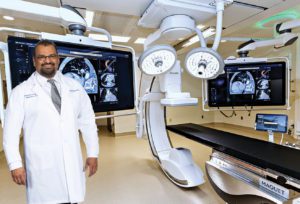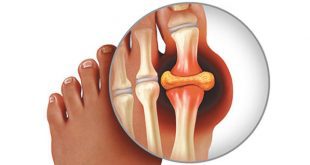

Every year in the United States nearly 800,000 people will suffer from a stroke. If it’s not caught early enough, it can lead to death, paralysis, cognitive impairment, aphasia, and many more complications. Stroke prevention cannot be stressed enough, and knowing the signs and symptoms are crucial.
There are three main types of stroke:
• Hemorrhagic strokes are when a damaged blood vessel begins to bleed then ruptures.
• TIA (Transient Ischemic Attack), also known as a mini-stroke, is caused by a temporary clot that blocks blood flow.
• Ischemic strokes are formed by blood clots that obstruct a blood vessel that supplies blood to the brain. Ischemic strokes account for about 87% of all strokes.
Recently, Nasser Razack M.D., J.D., neurointerventional surgeon and author of Stroke Made Simple, spoke to a full room at Bayfront Health Port Charlotte about acute ischemic stroke intervention (AIS).
Over the course of an hour, Dr. Razack discussed acute stroke intervention, its diagnosis and treatment, imaging studies and neurointervention. He focused on the significance of a hospital-based team approach for the management of acute ischemic stroke. While the treatment of all stroke is important, he stressed the recognition and treatment of large vessel acute ischemic stroke. This form of stroke results from the occlusion of large vessels in the brain which when left untreated may cause life threatening or severely debilitating stroke. During his presentation, he demonstrated that acute ischemic stroke large vessel occlusion can be quickly diagnosed and treated. Further, he not only emphasized the importance of having an efficient hospital-based process but stressed the equally important necessity of having a synchronous process with EMS personnel.
“Large vessel occlusion acute ischemic stroke makes up about 10% of all acute ischemic stroke but accounts for all acute ischemic stroke death, 90% of acute ischemic stroke societal cost and 80% poor functional outcome,” says Nasser Razack, M.D., J.D. “This is the most devastating form of acute ischemic stroke and the ability to treat it endovascularly will greatly serve our community. The practice of medicine continues to evolve but the treatment of acute ischemic stroke is probably the most rapidly developing modality within any field of medicine. A few short years ago, large vessel occlusion acute ischemic stroke was deemed non-treatable. Recent scientific trials have demonstrated the clear benefit of treating this horrible disease. We must be cognizant of the signs and symptoms of this disease so it can be rapidly diagnosed and treated.”
Dr. Razack also stressed the importance of time in acute stroke diagnosis and treatment. He discussed that many patients are not aware of the common signs and symptoms of stroke and simply do not get to the hospital soon enough to be treated. A simple mnemonic for the signs and symptoms of stroke is: “BE FAST.”
BE FAST stands for:
• B, Balance. Sudden loss of balance?
• E, Eyes. Loss of vision in one or both eyes?
• F, Face. Face looks uneven?
• A, Arm. Arm or leg weak, hanging down?
• S, Speech. Speech slurred? Trouble speaking or confused?
• T, Terrible headache. Thunder clap headache? Worst headache of your life?
If you or someone you know may be suffering from a stroke, dial 911 and get to the closest hospital immediately. Bayfront Health Port Charlotte and Punta Gorda have both achieved the Gold Seal of Approval from The Joint Commission as Primary Stroke Centers.
When a stroke happens, minutes matter. Bayfront Health invites you to attend an upcoming awareness event so you can be prepared with the facts, should you need to act fast.
Wednesday, May 15, 1:00 p.m.
B.E.F.A.S.T. to Spot a Stroke
Bayfron Health Punta Gorda Medical Plaza
4th Floor Conference Room
713 E. Marion Ave., Punta Gorda
Seconds count when it comes to surviving a stroke. Learn how to recognize signs and symptoms. Free. Register at www.BayfrontHealthEvents.com.
Tuesday, May 21, 11:30 a.m.
Control Your Risk Factors To Improve Your Brain Health
Speaker: Nasser Razack, M.D., JD.,
Neurointerventional Surgeon
Punta Gorda Isles Civic Association
2001 Shreve St., Punta Gorda
In observance of National Stroke Awareness Month, Dr. Razack will discuss stroke risk factors, the importance of brain health, signs and symptoms, and treatment. Free. Lunch provided. RSVP required. Call 941-637-1655 to register.
 Southwest Florida's Health and Wellness Magazine Health and Wellness Articles
Southwest Florida's Health and Wellness Magazine Health and Wellness Articles

